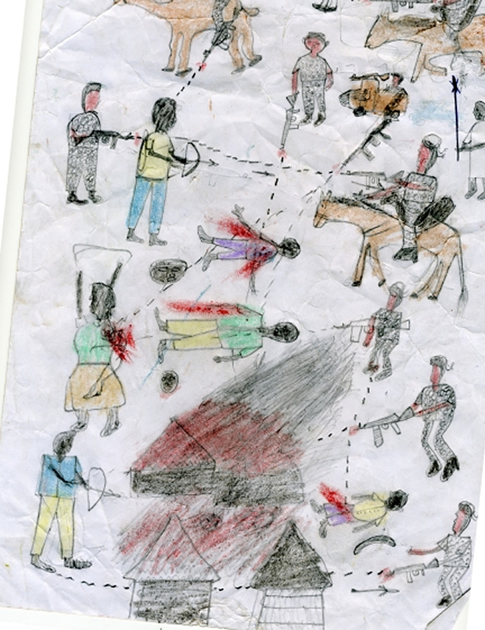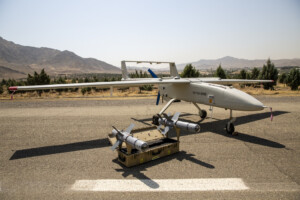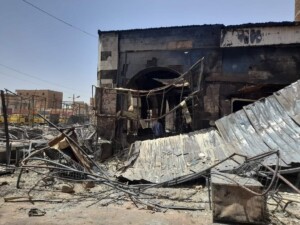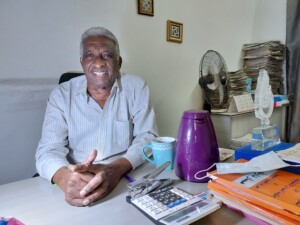Sudan’s silent suffering captured in ‘Children’s Drawings’

From left, Mohanad Hashim, Sarah Montgomery, Rebecca Tinsley, Elbashir Idris, and Richard Cockett pictured during the Waging Peace event 'War seen through children's eyes' book launch and panel discussion in London on Tuesday (Photo : Amgad Abdelgadir/RD)
In casting a spotlight on the ongoing crises devastating Sudan, Waging Peace launched a poignant new book titled The Children’s Drawings. Featuring dozens of artworks by Sudanese children, the eighty-page volume offers a stark portrayal of the harrowing experiences endured in conflict-ridden regions like Darfur and the Nuba Mountains.
Amgad Abdelgadir reports for Radio Dabanga on the thought-provoking panel discussion held at the Frontline Club in London today.
In June and July 2007, Waging Peace researcher Anna Schmitt conducted a three-week mission in Eastern Chad, assessing the humanitarian situation and gathering testimonies. Moved by accounts of children witnessing attacks, Anna provided paper and pencils to children aged six to 18, prompting them to express their dreams and memories.
Their drawings revealed disturbing details of attacks by Sudanese Armed Forces, Rapid Support Forces and their allied militia. Among the collection are striking depictions of the massacre at the General Command sit-in in Khartoum, serving as poignant reminders of the atrocities inflicted upon innocent civilians.
Rebecca Tinsley, Waging Peace’s president and founder, emphasised the urgent need to address the ongoing atrocities in Sudan. She lamented the lack of attention from regional and international leaders, decrying the “media vacuum” that allows such horrors to persist. Tinsley highlighted the resilience of Sudanese communities, particularly women who have faced sexual exploitation amidst the conflict’s chaos.
Referring to a drawing in the book that depicts women being bound together, she highlights the prevalent issue of sexual slavery within the conflict, particularly in Darfur.

The event, attended by a full house, shed light on the plight of Sudanese children who have borne the brunt of violence and instability. Journalist Mohanad Hashim, speaking on the eve of Ramadan ‘s final day, drew attention to the tragic events of June 3, 2019, known as the Ramadan 29 Massacre, where over 127 protesters were killed, with at least 100 missing and over 700 injured.
Hashim painted a grim picture of the humanitarian situation, describing a fractured society where children are deprived of education and grappling with the trauma of war, revolution, and the COVID-19 pandemic.
Elbashir Idris, activist and co-founder of the Sudanese Diaspora Network, drew parallels between his own experiences and those depicted in the children’s drawings. He expressed hope that the book would stand as a testament to the resilience of Sudanese communities, especially the work being done by resistance committees across Sudan.
However, he cautioned against complacency and called upon world leaders to take decisive action to alleviate the suffering in Sudan.
Sarah Montgomery OBE, the UK’s Special Envoy for the Red Sea and Horn of Africa highlighted the fragmented nature of mediation efforts in addressing the crisis.
International stakeholders, including special envoys and diplomats, pledged increased support for humanitarian efforts, with Minister for Development and Africa Andrew Mitchell, following his visit to Sudanese refugees in Chad, pledging to double aid efforts to Sudan.
Montgomery stressed the importance of empowering civil society and grassroots leaders in effecting meaningful change.
Now approaching the year anniversary of the conflict and as international support intensifies ahead of the Paris conference, there is a growing sense of urgency to address the root causes of conflict in Sudan and pave the way for lasting peace.











 and then
and then